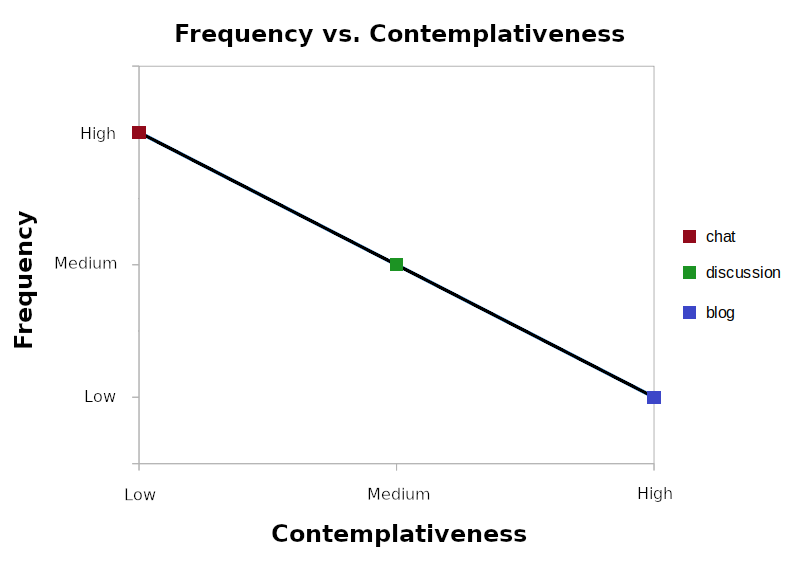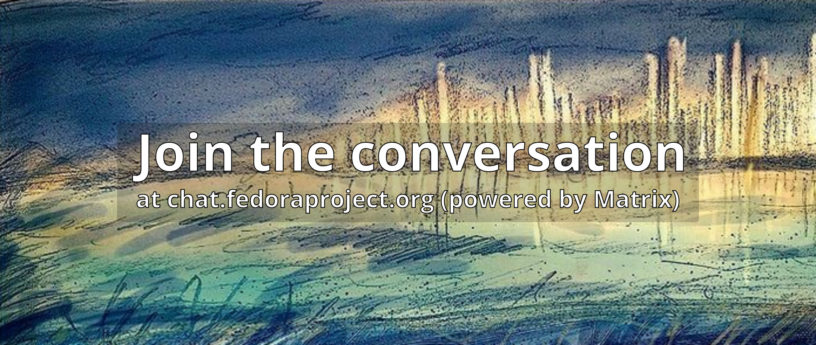U.S. politician Daniel Webster described the U.S. government as, “… the people’s government, made for the people, made by the people, and answerable to the people.”[1] Similarly, the Fedora Project is “a community of people working together”[2] and it is “led by contributors from across the community.”[3] In other words, “It is what you make of it.”[4]
The Fedora community invites you to join the conversation and help advance the Fedora Project and free software in general. Traditionally much of the collaboration in the Fedora Project had occurred over IRC. And IRC support will continue for the foreseeable future. But Fedora is also rolling out some newer technologies that we think might improve the user experience. Fedora has moved primary communications to Matrix for real time communication and collaboration. If you haven’t already done so, we encourage you to sign up for a Fedora account, open the Fedora Matrix space at chat.fedoraproject.org, and explore the vast world that is the Fedora Project via Matrix. As much as possible, the Fedora Project strives to be an open community. Anyone can contribute to Fedora and everyone of good will is welcome to join.
A high-level overview of the Fedora communication channels
As the saying goes, “Communication is key.” But communication comes in many forms. One subdivision of the various forms of communiction is synchronous and asynchronous. Traditionally, the Fedora Project has used email for asynchronous communication and IRC for synchronous communication. The forum discussion.fedoraproject.org is a new option for asynchronous communication and Matrix via chat.fedoraproject.org is a new option for synchronous communication.
Regarding the synchronous — asynchronous differentiation: It is good and important to differentiate our instruments in this dimension, and also to explain something. Synchronous does not mean that you get a reaction immediately, it can take a few days, if only because of the different time zones. But you can also “ping” someone specifically or invite them to a direct conversation. After some time, however, the topic will often be forgotten about on the timeline. Asynchronous tools, on the other hand, are organized thematically, bringing a topic to the front again and again as something is added to it. This provides a more systematic approach.
Importantly, the new tools are being provided as an option that you can choose. There is no requirement to use the new tools. You can expect both email and IRC to be around for a long time to come.
If you prefer email, you might want to check out the post: Guide to interacting with [discussion.fedoraproject.org] by email. If you prefer the IRC chat protocol, many of the rooms on Matrix at chat.fedoraproject.org are bridged to corresponding rooms on libera.chat.
Blog posts are yet another form of communication that will continue to be available at communityblog.fedoraproject.org and fedoramagazine.org. The former provides information expected to be of interest to the Fedora developers and Fedora special interest groups (SIGs). Posts about the tools used to build Fedora Linux, for example, are often found on the Community Blog. In contrast, this site — fedoramagazine.org — hosts articles expected to be of interest to the general Fedora community.
In a way, blog posts can be thought of as a super-asynchronous form of communication. The trade-off, as the forms of communication go from less-synchronous to more-synchronous, is that they tend to become somewhat lower in quality. That is, you can expect a much quicker response on IRC or chat.fedoraproject.org than if you request that a blog post be written about a subject on communityblog.fedoraproject.org. But of course, there is no guarantee that you will get a response on any of the channels. All contributions to the Fedora Project are voluntary. No one is ever obliged to provide any service to anyone else. But also don’t take a lack of response personally. Your question might just be outside the area of expertise of those who noticed it.
I like to think of the relationship between the various forms of communication that the Fedora Project uses as having an inversely proportional relation between frequency and contemplativeness.

The point is that these communication methods each serve different needs but they are complementary. You won’t want to limit yourself to just one of the communications channels. If you need rapid responses to simple questions, use the chat server. If you want to go in-depth on a complex topic, it might be something that would make a good blog post. And the forum is for everything in between.
So what are you waiting for! Sign up! Explore the community! If you come across something you think you can help out with or even just something that you think you might want to get involved with, jump in and offer to help! And above all, have FUN!
See also: What can I do for Fedora?
Thanks to Peter Boy, Kevin Fenzi, and others who provided helpful feedback and content for this announcement.
References
- Webster-Hayne debate
- Fedora’s Mission and Foundations — What is Fedora
- Fedora Leadership
- Paraphrased version of “A man’s life is what his thoughts make of it.” (Marcus Aurelius)






Mr Grandpa Leslie Satenstein, Montreal,Que
“For the people’s government, made for the people, made by the people, and answerable to the people.” is a fallacy. It is actually for the major political organizations, the billionaires who sponsor their candidates, and the corporations. People have no or virtually zero input.
But absolutely, the Linux community is different, and much more of a teamwork between hardware / software manufactures (The producers) and the end-users (we software developers and non-technical consumers). Still, there is the beginning of the disappearance of gpl3 type democracy.
Nowadays, we see the creeping commercialization of Linux, where some distributions provide a base level for free, and demand payments for the upgrade. That is the same pattern that the American founding fathers were aware would occur, and it did occur.
I am a 20 year Fedora user. I have to say that my role, as end-user, was to use Linux, suggest improvements, and report bugs. I have been delighted with the Fedora software that RedHat has sponsored. I make daily use of the desktop environment, and with a small family server component.
It is the organizations that funds Linux, not through charity, but motivated by business and competitive pressures that brings new features. Just think of software security, of program correctness, of system maintenance, and system deployment and who needed these improvements.
To the above, there is also the progression of electronic hardware as shown by the chip manufactures and the peripheral manufacturers. In the modern internet world, there is a general need for “smaller, faster and better”.
My role since retirement.
In the past, I have read and edited the admin guides from Fedora, as well as those from across the ocean. I have done that activity in English, French and Spanish languages. I have reviewed mathematics papers and software as well.
But to my disappointment, the editing tools that I use are not officially supported by the organization(s). Thus, my corrections or subject-matter reorganization remain my own or shared with few friends.
I definitely want to work more closely with Fedoraforum.org. But, too much of the collaboration tools are not suited for the “end-user”. For example,
I use libreOffice against copies of the various Fedora publications. I use the “track changes” and comments facilities to mark up grammar errors, or ask for clarification. My editing is a teamwork between partners strong in grammar and software engineering. Yet, asciidoc, a software that is for publishing corrected results, does not really offer tools for an “editor collaboration team” role.
PS, I have written utilities, and share them between friends. I do want to provide feedback based on my 60+ years of software engineering. And yes, I will continue to provide constructive feedback whenever the opportunity prevails.
Marcelo
I completely agree with you, I also have difficulties in helping not only the fedora project but linux projects, I feel that everything is bureaucratic and difficult, currently a serious problem has left the startup and shutdown very slow and even to categorize the problem and open a call on stackoverflow it’s confuse.
Daniels
I see the ( Negative Slope) in the Plot above : As the Inversely proportional (Frequency Dependant Variable / Contemplative Independent Variable) of various means of communications within the Fedora community may in fact be The Model.
I just wanted to look outside the bubble and AI just gets more and more in the picture of Fedora’s great abundance for Education, Industry, Art, Design etc. I see Medium to High for me in 2023…. and beyond . I think I get more and more out of it- if I dig deeper. (High – High). Interesting!
Peter V. Daniels
Rajarama Shetty
I am a user of Fedora from its first version to latest version with a miss of few last versions and few Redhat versions before Fedora conceived. It all started around year 2000 attracting me and I learnt from students while working at NITK, Surathkal. Of course I am not a certified linux guy but people around me found and certified that I am mad with Linux.
It became a hobby to download every version, enjoying, struggling to make some packages work and sometimes struggling some hardware work. Much of my valuable time were consumed by printers, TV Tuner card and Video cards.
It was my happy moment of joy when I succeed and sometimes I am joyful after years when a new version arrived that solved a big headache.
It was the time M$ hell bent on killing Linux and OpenSource. Because we are mad with Linux, disliking MS also incorporated to our gene. It is a real embarrassment to see encouraging Windows packages in Linux platform when lot of people struggled to safeguard the platform from MS attack. My inner conciousness is – Keep MS away. Be it Gold or Diamond. Enough… Keep it away.
My recent struggle was to make the Sharp MX-1810U work with Linux. Unfortunately, I left the organization and lost the chance to continue fighting with Sharp MX-1810U.
My suggestion to Developers and Lovers of Coding is – Don’t follow other confusing platforms. In the name of change, don’t confuse the user and don’t make the ardent users to relearn the same stuff again and again. Don’t get lost by commercial world absorbtion. You are doing injustice to your (package) lovers.
My suggestion to platform designers – Well. You are doing good job. But don’t keep anything hidden junk that always make user to talk to you in the name of updation. Give users their freedom. Let the legacy continue.
All the best to Fedora Community. Long live Linux.
Grandpa Leslie Satenstein, Montreal,Que
I started around year 2000 with Unix, as I was an ERP system engineer. I learned much from Unix’s man pages.
In 2004, a friend gave me a Linux Distro DVD, and the rest is history. That DVD was published as an attachment to a magazine. One DVD that I liked was called Core. All of Linux at that time, filled about 600megs of a 800meg DVD. Communication was with dialup and tone-signaling. It was way before Data was available.
Rainer
Why do you refer to a person (Daniel Webster) that was for slavery??? Wikipedia-Quote: “Webster was one of the driving forces behind the Fugitive Slave Law of 1850….a law that obliged the authorities of the northern states to arrest escaped slaves and give them back to their owners.”
The open source spirit is exactly the opposite of that.
A nuclear submarine is named after Daniel Webster. “USS Daniel Webster (SSBN-626)”
All that has absolutely nothing to do with community and freedom and linux and open source!
Also…i do not think that it is the best idea to refer to the U.S.-Congress, when we talk about freedom, open source and community. The U.S.-Congress started one war after another. And a person that is for slavery should really not be quoted for an intro to a linux-article!
Gregory Bartholomew
That’s interesting. I never heard of such things. I don’t know if they are true or not, but the point was simply to credit the quotation. Nothing more.
BTW, Abraham Lincoln also quoted him and he is known for abolishing slavery in the U.S.
Rainer
Ok. Then take Lincoln instead of Webster for your article. BTW, the same Wikipedia-article that has this quotation in it also says that Webster was for slavery. So if you take this quotation as true….you can take the rest for true as well. But really…there are so many persons to take quote from that are not for slavery. Your article is not reliant to Webster.
Darvond
I’ve been using Fedora since Barry was in office, and I’d poked it as early as F17, before the big split.
As it stands, there’s always been a stigma of gatekeeping around the Linux community, of which is not helped when entire developer groups appear to literally live to that stigma, turning what should be free coding into a dogma.
Quite simply, I’ve become out of touch with what passes for modern communication platforms. And I’m about as social as LT is Finnish. I enjoy the semi-anonymity bridged here without the obligation to go any further.
And then you have people like RMS who make it weird and awkward for everyone.
I feel if I were to join the conversation, that I’d come quickly to butting heads, especially over what would be deemed priorities and worthless trends in my own eyes. I have for example, loudly advocated against the primary desktop environment of Fedora.
I like how transparent the KDE team is on everything from bugfixes to their looks ahead. It makes it look like a nice unified front where things make sense, instead of a secretive cabal where it takes 20 years to fix a longstanding bug because that simply is not the will of their universe or something, even if it would have taken a 15 minute session to fix.
I’m also not a coder, so I’d feel double excluded. The most I’ve done are simple batch scripts. This loops back around to prioritizing and butting heads, because I imagine there’s a bureaucratic nature to why packages that haven’t been updated since 2006 are still in the repositories, why FVWM hasn’t been updated to 3, or why many free/open source typefaces are missing, or why Flatpak exists.
I know the SiGs exist, but a part of me wonders if that’s the right methodology. I don’t know how other distros organize themselves, and I feel that some of the work is redundant or should be platform agnostic.
Gregory Bartholomew
Even if you cannot find anything (positive) to say/contribute, lurkers are still welcome. 🙂 It probably is best to keep criticism to a minimum though. At least to-date, Fedora Linux still allows a lot of freedom with respect to what desktop environment you want to use. (I’m writing this from a Sway DE that I’ve installed on Fedora Linux Workstation edition.)
Daniels
Thank you Mairin Duffy for the Lead in Art to “Join the Conversation”. I’m using it for my Desk Top Background. (Hence the Link.) Peace to You. Peter V. Daniels
Renich Bon Ćirić
Hmm.. I’ve read some of the most interesting comments in a while today.
I’m, also, a Fedora core 1 user. I’ve been here since the beginning. I never expected an article like this to bring real conversation to the comments section.
I hope it doesn’t get shutdown or, at least, that this sprouts a few interesting topics in discussion.fedoraproject.org.
That said, I don’t agree with some things said here but I truly believe in real conversation going on; where some of us don’t agree and say it without fear of a ban or something similar.
Interesting. Keep it going.
Gregory Bartholomew
If you are referring to the political banter, just FYI, for the most part that is considered off-topic and discouraged because some people can get quite passionate about that sort of thing. Some channels even outright state that they do not want to see any of it in their chatrooms (e.g. Fedora Social). So I would advise people to tread lightly in that arena. I’m a moderator on these comments, so perhaps I should have rejected those comments and not responded to them. But I’m a fan of free speech, so I have a tendency to let through a bit more than I should.
Grandpa Leslie Satenstein, Montreal,Que
I have a message for Mr Cotton and others. Why are these postings not presented on YouTube. There is a Fedora YouTube channel. The magazine section could be uploaded to YouTube and it would also serve as a Fedora Promotion
Gregory Bartholomew
There are links from this site to YouTube and other social media channels (the icons in the upper-right). Linking from them back to this site isn’t a bad idea. If you want to get in touch with the Marketing folks, you might drop a line here: https://chat.fedoraproject.org/#/room/#marketing:fedoraproject.org
Truls Gulbrandssen
In this context, Fedora Magazine should also consider a Mastodon account and link.
Gregory Bartholomew
Good point. I’ve put it on my TODO list. 🙂
FYI, I think this is Fedora’s official Mastodon account: https://fosstodon.org/@fedora/
I’ll work on getting that added to the social media links in the header on this site.
Gregory Bartholomew
FYI: I’ve added Fedora’s Fosstodon account to the social media icons in the upper-right. 🙂
Ira Minor
This is a wonderful idea. I think it will prove very beneficial for Fedora and for everyone involved. I’m retired and looking for ideas to keep me active physically and mentally. I’ve ruled out a lot of activities. What I’ve decided to do and am doing is to learn Fedora Linux and the Rust Language. My goal is to write utilities that will make Fedora run faster than Apple and to measure performance. I have set up a workshop in my home in Southern California. I have an Apple Mac, I have Fedora 37 running on both Intel and ARM machines. I also have Windows 11 running on both Intel and ARM. Forunatly none of this needs to be on-line very often, just for updates. On-line I use ChromeOS Flex on an Intel based machine. All of my systems have both C and Rust Compilers…..Ira
Muhammad Anas
I’m interested
Hugo Gaudin
Tell me something: isn’t Red Hat part of Kyndryl? And aren’t a lot of Fedora project managers just paid Red Hat employees?
From what I hear from people, Kyndryl isn’t doing well as a company. They’ve had MANY layoffs lately. There are pretty well zero engineers and general IT workers left in Canada, and even overseas workers are getting laid off (not really “laid off”, just terminated). From the information I’m getting from workers on the inside who manage some of the big client contracts are having their teams eliminated out from under them, they’re saying that Kyndryl looks to be set up for failure and dissolution by management. If that happens, doesn’t Red Hat go down the drain, and those paid employees managing some of the biggest Linux projects don’t have a job? This spells disaster for the Linux community as a whole since much of the core parts and major projects for Linux distributions both big and small come from Red Hat employees.
What is your take on this?
Gregory Bartholomew
Your question is probably a bit off-topic for the comments section of this post, but FWIW, none of the current editors of Fedora Magazine are Red Hat employees. So in theory, at least Fedora Magazine could keep going even if that tech company were to face tough times. I would assume that, likewise, other Linux contributors could volunteer more of their time without compensation if they had to. I don’t think there is any way to know how well Fedora Linux would fair without Red Hat’s generous support. Let’s hope we never find out. 🙂